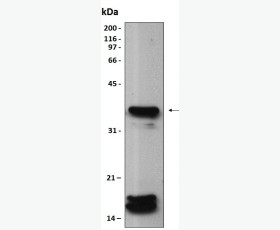Recombinant Human KIR2DL3/NKAT2/CD158b2
| Product name: | Recombinant Human KIR2DL3/NKAT2/CD158b2 |
| Source: | Human Cells |
| Purity: | Greater than 95% as determined by reducing SDS-PAGE. |
| Buffer Formulation: | Lyophilized from a 0.2 μm filtered solution of PBS, pH7.4. |
| Applications: | Applications:SDS-PAGE; WB; ELISA; IP. |
| Storage: | Avoid repeated freeze/thaw cycles. Store at 2-8 oC for one month. Aliquot and store at -80 oC for 12 months. |
| UOM: | 100ug/50ug/200ug/1mg/1g |
| Source | Human Cells |
| Description | Recombinant Human KIR2DL3 is produced by our Mammalian expression system and the target gene encoding His22-His245 is expressed with a Fc tag at the C-terminus. |
| Names | Killer cell immunoglobulin-like receptor 2DL3, KIR2DL3, CD158b2, NKAT2, CD158 antigen-like family member B2, KIR-023GB, Killer inhibitory receptor cl 2-3, MHC class I NK cell receptor, NKAT-2, p58 NK receptor CL-6 |
| Accession # | P43628 |
| Formulation | Lyophilized from a 0.2 μm filtered solution of PBS, pH7.4. |
| Shipping |
The product is shipped at ambient temperature. |
| Reconstitution |
Always centrifuge tubes before opening. Do not mix by vortex or pipetting. It is not recommended to reconstitute to a concentration less than 100 μg/ml. Dissolve the lyophilized protein in ddH2O. Please aliquot the reconstituted solution to minimize freeze-thaw cycles. |
| Storage |
Lyophilized protein should be stored at < -20°C, though stable at room temperature for 3 weeks. Reconstituted protein solution can be stored at 4-7°C for 2-7 days. Aliquots of reconstituted samples are stable at < -20°C for 3 months. |
| Purity |
Greater than 95% as determined by reducing SDS-PAGE. |
| Endotoxin | Less than 0.1 ng/µg (1 IEU/µg) as determined by LAL test. |
| Amino Acid Sequence |
HEGVHRKPSLLAHPGPLVKSEETVILQCWSDVRFQHFLLHREGKFKDTLHLIGEHHDGVSKANFS IGPMMQDLAGTYRCYGSVTHSPYQLSAPSDPLDIVITGLYEKPSLSAQPGPTVLAGESVTLSCSS RSSYDMYHLSREGEAHERRFSAGPKVNGTFQADFPLGPATHGGTYRCFGSFRDSPYEWSNSSDPL LVSVTGNPSNSWLSPTEPSSETGNPRHLHVDDIEGRMDEPKSCDKTHTCPPCPAPELLGGPSVFL FPPKPKDTLMISRTPEVTCVVVDVSHEDPEVKFNWYVDGVEVHNAKTKPREEQYNSTYRVVSVLT VLHQDWLNGKEYKCKVSNKALPAPIEKTISKAKGQPREPQVYTLPPSREEMTKNQVSLTCLVKGF YPSDIAVEWESNGQPENNYKTTPPVLDSDGSFFLYSKLTVDKSRWQQGNVFSCSVMHEALHNHYT QKSLSLSPGK
|
| Background | Killer-Cell Immunoglobulin-Like Receptors (KIRs) are important cells of the immune system. KIRs are a family of Natural Killer (NK) Cells surface glycoproteins. KIRs control the killing function of these cells by interacting with MHC class I molecules. This interaction allows KIRs to identify virally infected cells or tumor cells by the distinctive low level of Class I MHC on their surface. The majority of KIRs are inhibitory, their recognition of MHC suppresses the cytotoxic activity of their NK cell. Only a limited number of KIRs have the capacity to activate cells. KIR2DL3 is an inhibitory Killer Cell Ig-like Receptor. KIR2DL3 recognizes class I MHC molecules (HLA-Cw1, -Cw3, -Cw7, and Cw8). KIR2DL3 inhibits the activity of NK cells thus preventing cell lysis. |














